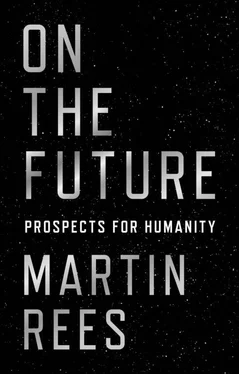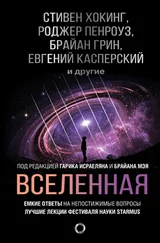Neanderthal, potential clone of, 82
networks, vulnerable, 108–9. See also electricity grids; internet
neutron stars, 162–63
New Horizons spacecraft, 142
Newton, Isaac, 165, 171, 187, 194, 195, 196–97, 205
normal science, Kuhnian, 205
nuclear deterrence, 19
nuclear energy, 53–57; based on twentieth-century physics, 64; for low-carbon energy generation, 48; prospects for fusion, 48, 54–55; public fear of radiation and, 53, 55; for spaceflight, 148
nuclear fusion: as energy source, 48, 54–55; in Sun and stars, 122, 123
nuclear weapons: Cold War and, 17–20; collapse in global food supplies and, 216; not necessarily an existential threat, 110; public engagement of atomic scientists and, 222; in response to cyberattack, 21
nuclear winter, 19, 216
Obama, Barack, 48
ocean acidification, 58
online courses, 98–99
On the Origin of Species (Darwin), 121, 196
Open University of U.K., 98
optimism: about life’s destiny, 227; about moral progress, 6; about technological fixes for climate change, 42; about technology, 5, 225–26; machines surpassing human capabilities and, 108; Wells’s mix of anxiety and, 14
organ transplants, 71–72
origin of life, 128–29, 135–36
Our Final Hour (Rees), 12–13
ozone depletion, 31–32
pale blue dot, 10, 120, 133, 164
Paley, William, 197–98
pandemics: advances in microbiology and, 72; air travel and, 109; as global threat, 216, 217; magnitude of fallout from, 76–77
paradigm shifts, 205
Parfit, Derek, 116–17
Paris climate conference of 2015: Mission Innovation of, 48; papal encyclical and, 35; protocols following on, 219; temperature goal of, 41; uncertain results of, 44, 57
particle accelerators: Large Hadron Collider, 206–7; speculation on risks of, 110–16, 118; teams working on big projects of, 205–6
Pauli, Wolfgang, 209
Peierls, Rudolf, 222
personal identity, 105
pessimism, 226–27
Petrov, Stanislav, 18
Pfizer, abandoning neurological drugs, 212
philosophers of science, 203–5
physical reality: aliens with different perception of, 160, 190; human-induced threats and, 118; limited power of human minds and, 9, 189–90, 194; observable universe and, 181; our constricted concept of, 184. See also multiverse; universe
Pinker, Steven, 75–76
planetary boundaries, 32
PlanetLab, 141
planets: as consequence of big bang, 214; found with most stars, 129–30; habitable, 125, 126–27, 133, 135–36; spacecraft sent to, 142–43; techniques for finding, 130–32, 133–35. See also Earth; Mars; solar system; Venus
plastics, 37
plate tectonics, 174–75
Pluto, 142
Poker, played by computer, 87
polio virus, synthesised, 64
political impediments: to addressing anthropogenic global changes, 32; electoral goals and, 28–29, 226; to enhancing lives of the poorest, 26; public opinion and, 10; to scientists’ influence on policy, 223; short-term thinking and, 28, 32, 35, 217; to sustainable and secure world, 226
Polkinghorne, John, 198–99
Pontifical Academy of Sciences, 34
Pope Francis, 34
Popper, Karl, 203–5
The Population Bomb (Ehrlich), 22
population growth: atmospheric carbon dioxide and, 1, 40; at decreasing rate, 21–22; food and resources keeping pace with, 22; loss of biodiversity associated with, 32–33; to nine billion by 2050, 9, 31; predicting future of, 29–31; serious consequences of technology and, 215; straining natural environment, 4, 12–13, 21–24; sustainable maximum and, 23; as taboo subject for some, 22; technology to address demands of, 5, 60
positrons, 169
posthuman era, 150–54, 158, 164
posthuman evolution, 9, 152–53, 178
posthuman intelligence, 169–70, 194. See also inorganic intelligences
poverty: Catholic Church and, 34, 35; decrease in, 5; impact of internet and, 83–84, 99; migration for alleviation of, 100; political impediments to alleviating, 26; religious communities and, 224
poverty trap, 30
precautionary principle, 225–26
prediction: complexity and, 174; difficult with unprecedented changes, 7; fundamental limit to, 171; history of failures in, 11–12
privacy: AI systems and, 90; societal shift towards less, 78
Project Orion, 79
quantum computing, 185, 192
quantum mechanics, 166, 168, 180, 184, 205, 210–11
Queloz, Didier, 130
radiation: over-stringent guidelines about low-level, 55, 56–57; public fear of, 53, 55
radioactive waste disposal, 43, 53, 54
radio telescopes, 134, 144, 157, 207
Ramanathan, Ram, 34
reality. See physical reality
recycling, 37, 46
redistribution of wealth, 6, 95–96
reductionism, 176, 177
refugees: investing to provide employment for, 28. See also migration
regulations: international, 218–19; for potentially hazardous technologies, 218; public mind-set and, 35–36
religion, 194–200; Catholic Church, 34–35, 65; communal and ritual aspects of, 200; engagement with global issues, 224; evolution and, 195–98; scientists’ views on, 194–95, 198–99; striving for peaceful coexistence with, 199–200
renewable energy, 48–51, 60
Repository for Germinal Choice, 68–69
Research and Development (R&D), to mitigate climate change, 47–55
responsible innovation, 218, 225
the resurrection, 198–99
robots: assembling future space telescopes, 137; in automated warfare, 101; autonomous, 107; for care giving tasks, 96; intelligent, 8, 152–53 ( see also inorganic intelligences); landed on a comet, 142; limited agility of, 88–89; manufacturing in wealthy countries with, 99; nanoscale electronic components for, 83; optimism about, 5; as potential threat to civilisation, 109–10; self-awareness and, 153; in space, 119, 143, 144; space voyagers and, 151, 152. See also AI (artificial intelligence)
Rockström, Johan, 32
Roomba, 106
Rosetta space mission, 142
Rotblat, Joseph, 222
Royal Society of London, 61
Rumsfeld, Donald, 189
Russell, Stuart, 103, 106
Safire, William, 139
Sagan, Carl, 120–21, 133, 156, 223
satellite technology, 140–42
Saturn, 142–43, 214
Schrödinger’s equation, 166, 176
science: discouraging trends for young talent in, 211–12; diverse practices and styles in, 205–6; as a global culture, 214–15; great unifying ideas of, 174–75; hierarchy of, 175–77; need for public understanding of, 213–15; new technology and instruments for, 206–7; philosophy of, 203–5
scientific method, 202
scientists: aging of, 209–10, 211; amateur, 157, 212; arc of a research career, 208–11; engaging with the public, 9–10; independent of research universities, 212–13; intellectual abilities of, 202–3; involvement with ethical issues, 74–75, 221–24; philosophers and, 203–5
sea level rise, 39
security measures, 219–20
self-awareness: AI and, 107, 153; mystery of the brain and, 193. See also consciousness
self-driving vehicles, 92–95, 102–3
sensor technology, 88, 102–3, 143
SETI (search for extraterrestrial intelligence), 156–64. See also aliens, intelligent; planets
Shockley, William, 68–69
Shogi, 87
short-termism, 28–29, 32, 45, 225, 226. See also timescales
silicon chip, complexity of, 173
Silicon Valley, push for eternal youth in, 80–81
Simpson, John, 222
the singularity, Kurzweil on, 108
The Skeptical Environmentalist (Lomborg), 42
smallpox virus, 73
smart grids, 48
smartphones, 6–7, 83, 84, 91, 104, 216
Читать дальше


![Мартин Рис - Всего шесть чисел. Главные силы, формирующие Вселенную [litres]](/books/414169/martin-ris-vsego-shest-chisel-glavnye-sily-formir-thumb.webp)









